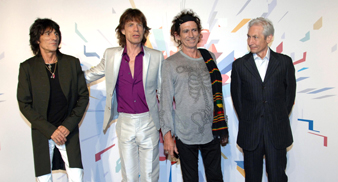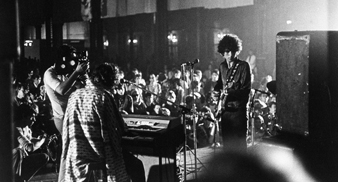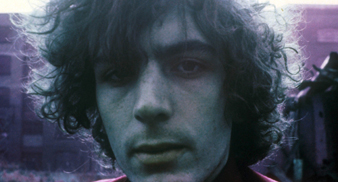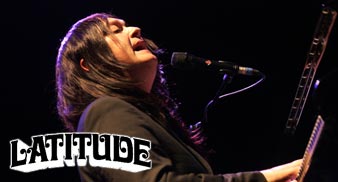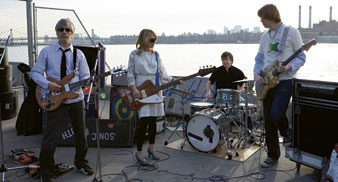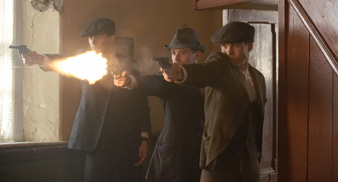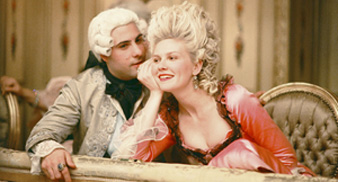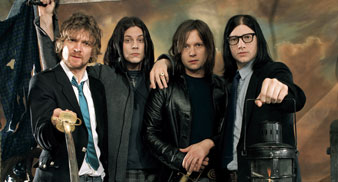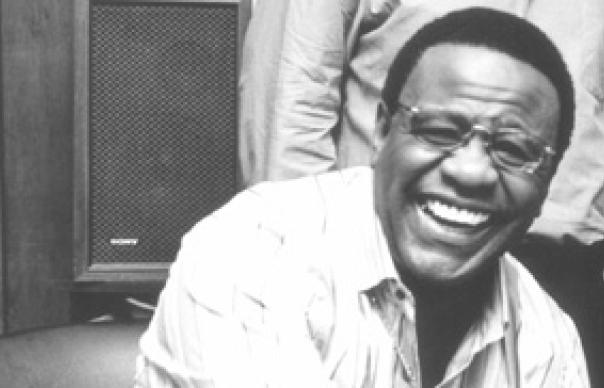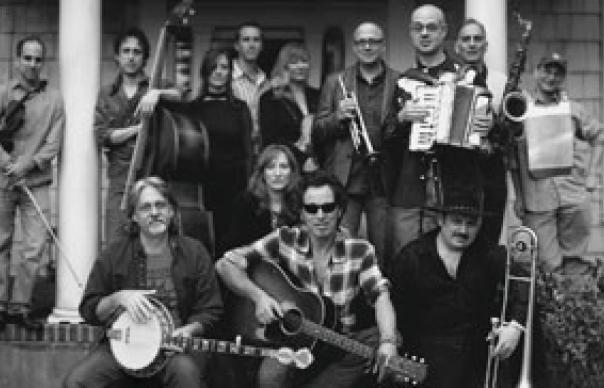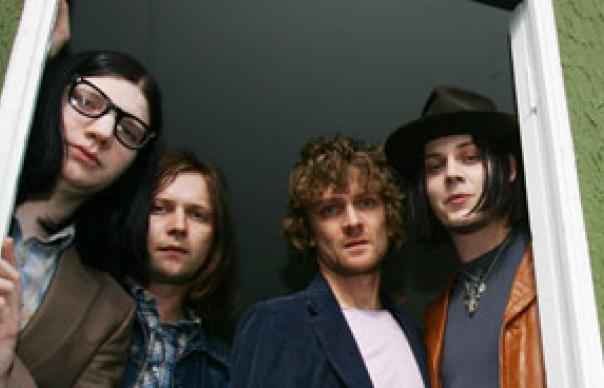It’s now Uncut's third year at the Benicassim Festival, located on the coast of Spain roughly midway between Valencia and Barcelona. We’ve watched the festival grow from its relatively small-scale roots to become one of the major players on the European festival circuit, driven by a seductive mix of climate, location (the site sits between mountains and beach), and an increasingly prolific bill. Not to mention the hedonistic opportunities presented by the fact that the festival takes place almost entirely at night. It’s gone from a well-kept secret to an essential date in an already over-burdened festival calendar, the best festival outside the UK. On our flight out to Spain, the entire passenger manifest is heading to the festival.
And who can blame them? When British festivals number pear cider, mud and dodgy burgers among their added attractions, the idea of sun, the beach and vodka Fanta limon suddenly seems like an incredibly desirable alternative.
This line up is certainly impressive: from marquee names (Morrissey, Depeche Mode, Scissor Sisters, the Pixies) to mid-range credibility (Editors, Soulwax, We Are Scientists) and a healthy smattering of local Spanish bands. This year, the festival have inaugurated a policy to kick each day off with a bang – so, come 6pm, in temperatures still over 25 degrees, the Fibtent (capacity: 2,000) plays host on consecutive nights to Babyshambles, the Organ and the Editors.
Babyshambles’ Pete Doherty delivers a brilliant opening 10 minutes – focussed, charismatic, and playful – before seeming to lose concentration, frustratingly resorting to glib, crowd-pleasing tactics to raise a cheer. Gasp as Pete bounces a balloon on his head! Applaud as he wraps himself in a Union flag with ‘Fuck Forever” written on it! There’s a strange moment at the end of the set, when Shane MacGowan arrives on stage for a version of “Dirty Old Town”: with a ghastly grey complexion suggesting he’s already been fitted by the undertakers, Shane’s grizzly presence seems like a warning from the future. This is what you get when you piss away your talent, Pete. Do yourself a favour.
The Organ – an all-girl five-piece from Vancouver – deliver a fine approximation of post-Smiths indie rock, all patent Sarah label jangle guitars while vocalist Katie Sketch channels something of the spirit of Ian Curtis. More Joy Division references via The Editors, who’re easily the best band in this particular timeslot – they clearly work hard to deliver a memorable set, drummer Ed Lay deserves particular praise for a markedly intense performance.
The Thursday night – something of a warm-up to the rest of the weekend – finds Giant Sand’s Howie Gelb wading through his gumbo gospel groove before Scissor Sisters headline. Opening with barn-storming versions of “Take Your Mamma Out Tonight” and “Laura”, their camp theatrics are a colourful enough attraction, before they previous new material from their forthcoming album Ta Dah, climaxing with a combustible “Filthy Gorgeous”.
When they reformed in 2004, Friday headliners The Pixies decided not to bother writing any new songs: and why should they, with a back catalogue like theirs? Accordingly, they may well prove to be among the greatest of festival bands, working through an impressive set that doesn’t contain an ounce of fat on it. In fact, they go down so well their performance is temporarily halted for thirty minutes when the barrier at the front of the stage collapses under the weight of 25,000 fans rushing to the front.
It’s now Uncut‘s third year at the Benicassim Festival, located on the coast of Spain roughly midway between Valencia and Barcelona. We’ve watched the festival grow from its relatively small-scale roots to become one of the major players on the European festival circuit, driven by a seductive mix of climate, location (the site sits between mountains and beach), and an increasingly prolific bill. Not to mention the hedonistic opportunities presented by the fact that the festival takes place almost entirely at night. It’s gone from a well-kept secret to an essential date in an already over-burdened festival calendar, the best festival outside the UK. On our flight out to Spain, the entire passenger manifest is heading to the festival.
And who can blame them? When British festivals number pear cider, mud and dodgy burgers among their added attractions, the idea of sun, the beach and vodka Fanta limon suddenly seems like an incredibly desirable alternative.
This line up is certainly impressive: from marquee names (Morrissey, Depeche Mode, Scissor Sisters, the Pixies) to mid-range credibility (Editors, Soulwax, We Are Scientists) and a healthy smattering of local Spanish bands. This year, the festival have inaugurated a policy to kick each day off with a bang – so, come 6pm, in temperatures still over 25 degrees, the Fibtent (capacity: 2,000) plays host on consecutive nights to Babyshambles, the Organ and the Editors.
Babyshambles’ Pete Doherty delivers a brilliant opening 10 minutes – focussed, charismatic, and playful – before seeming to lose concentration, frustratingly resorting to glib, crowd-pleasing tactics to raise a cheer. Gasp as Pete bounces a balloon on his head! Applaud as he wraps himself in a Union flag with ‘Fuck Forever” written on it! There’s a strange moment at the end of the set, when Shane MacGowan arrives on stage for a version of “Dirty Old Town”: with a ghastly grey complexion suggesting he’s already been fitted by the undertakers, Shane’s grizzly presence seems like a warning from the future. This is what you get when you piss away your talent, Pete. Do yourself a favour.
The Organ – an all-girl five-piece from Vancouver – deliver a fine approximation of post-Smiths indie rock, all patent Sarah label jangle guitars while vocalist Katie Sketch channels something of the spirit of Ian Curtis. More Joy Division references via The Editors, who’re easily the best band in this particular timeslot – they clearly work hard to deliver a memorable set, drummer Ed Lay deserves particular praise for a markedly intense performance.
The Thursday night – something of a warm-up to the rest of the weekend – finds Giant Sand’s Howie Gelb wading through his gumbo gospel groove before Scissor Sisters headline. Opening with barn-storming versions of “Take Your Mamma Out Tonight” and “Laura”, their camp theatrics are a colourful enough attraction, before they previous new material from their forthcoming album Ta Dah, climaxing with a combustible “Filthy Gorgeous”.
When they reformed in 2004, Friday headliners The Pixies decided not to bother writing any new songs: and why should they, with a back catalogue like theirs? Accordingly, they may well prove to be among the greatest of festival bands, working through an impressive set that doesn’t contain an ounce of fat on it. In fact, they go down so well their performance is temporarily halted for thirty minutes when the barrier at the front of the stage collapses under the weight of 25,000 fans rushing to the front.
After a lacklustre showing at last month’s Wireless festival, THE STROKES redeemed themselves with a cracking greatest hits set – “Last Night”, “New York City Cops” and “Someday” alongside new single, “You Only Live Once”.
Saturday finds Uncut torn between the twisted House music antics found in the Fibtent – commandeered for the night by the Soulwax crew – and Franz Ferdinand, headlining the main stage. In the end, we opt for what proves to be the festival highlight, as messers Kapranos and ko tear through an incredible 90 minute set. For those who’re prepared to write the Franz off as yesterday’s news, their art school pop superseded by the more conventional rock antics of the Artic Monkeys or Razorlight, this is a wake up call. “Take Me Out”, “Matinee”, “Michael” and “Do You Want To” are buffed to perfection, delivered with panache and furious energy. The crowd response is understandably overwhelming, ecstatic even. It’s a formidable performance.
The same can’t quite be said of Morrissey. Bless him for bothering to turn up this year, after a no-show in 2004 (something he even makes of point of wryly acknowledging in one of his many between-song epistles from on high to the gathered multitude). He starts off brilliantly, with a delirious version of “Panic”. We get “Girlfriend In A Coma”, “Still Ill” and “How Soon Is Now?”, as well as “First Of The Gang To Die” and “Irish Blood, English Heart”, but unwisely opts he for too many mid-tempo torch songs from “Ringleader Of The Tormented”, which never really hit the spot.
Sunday’s finale sees UNCUT running frantically between stages, catching regrettably little of We Are Scientists, finding us instead drawn to Madness’ nutty boy fun. We bump into Chaz Smith emerging from the backstage pool, reminding us of Ray Winstone sizzling in Sexy Beast: “It’s fahking hot in Spain.” Like the Pixies, Madness understand the demands of the festival circuit, liberally interspacing tracks from their Dangermen Sessions Volume 1 album of cover versions with the hits – “Our House”, “One Step Beyond” and “Night Boat To Cairo”. If Spain is the spiritual home of every British expat, then Madness have found their audience. Uncut even spots a conga line winding its way through the crowd during “House Of Fun”. They may not exactly be cutting edge, but they succeed in putting more smiles on paying punters’ faces than almost any other band appearing.
Which can’t be said for Depeche Mode. It’s as if they sat down backstage and worked out a set list as deliberately far removed from being festival-friendly as possible; their brand of industrial melancholia hardly suited to the balmy Spanish night. It’s only the last 30 minutes, when we get “Walking In My Shoes”, “Personal Jesus” and “Enjoy The Silence” that they engage with the crowd.
Two other festival high points come from relatively unknowns in our world: Art Brut and The Rakes. The endearingly eccentric Art Brut cheerfully admit they only have 40 minutes worth of material to fill an 100 minute slot, so pad out their set with a Scientists’ cover (with help from the band themselves) and an extended jam during which singer Eddie Argos reads out the festival line-up. It displays a bravado that’s entirely laudable. The Rakes, meanwhile, looking uncannily like a band who’ve not slept for three days, manage to turn round a flagging audience in their 4am graveyard slot by dint of sheer willpower and some thrilling, guitar-driven anthems. Their rather questionable state of health only endears them to us more. Drunk, sleep-deprived British guitar band storm Spanish rock festival? Gosh. Call the cops.
See you next year!
Michael Bonner




